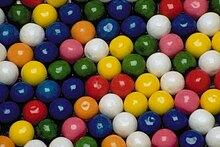| Revision as of 17:37, 26 May 2016 editDcirovic (talk | contribs)Autopatrolled, Extended confirmed users, Pending changes reviewers, Rollbackers253,275 edits Reverted edits by 64.90.250.251 (talk) (HG) (3.1.20)Tag: Huggle← Previous edit | Revision as of 17:43, 26 May 2016 edit undoFitindia (talk | contribs)Autopatrolled, Extended confirmed users, Page movers, File movers, New page reviewers, Pending changes reviewers, Rollbackers73,533 edits Reverted 1 pending edit by 64.90.250.251 to revision 722214541 by Dcirovic: possible vandalismNext edit → |
| (One intermediate revision by one other user not shown) | |
| (No difference) | |
Revision as of 17:43, 26 May 2016
For other uses, see Bubblegum (disambiguation).
| This article needs additional citations for verification. Please help improve this article by adding citations to reliable sources. Unsourced material may be challenged and removed. Find sources: "Bubble gum" – news · newspapers · books · scholar · JSTOR (July 2012) (Learn how and when to remove this message) |
 A woman blowing a bubble with bubble gum. A woman blowing a bubble with bubble gum. | |
| Type | Chewing gum |
|---|---|
| Created by | Walter E. Diemer |
Bubble gum is a type of chewing gum, designed to freshen breath and to be inflated out of the mouth as a bubble.
History
In 1928, Walter E. Diemer, an accountant for the Fleer Chewing Gum Company in Philadelphia, was experimenting with new gum recipes. One recipe was found to be less sticky than regular chewing gum, and stretched more easily. This gum became highly successful and was eventually named by the president of Fleer as Dubble Bubble because of its stretchy texture. The original bubble gum was pink in color because that was the only dye Diemer had on hand at the time and it was his favorite color. This Dubble Bubble chewing gum was said (by many critics) to have a very rotten egg texture.
In modern chewing gum, if natural rubber such as chicle is used, it must pass several purity and cleanliness tests. However, most modern types of chewing gum use synthetic gum based materials. These materials allow for longer-lasting flavor, a better texture, and a reduction in tackiness.
Decline in popularity
Chewing gum was widely popular from the mid 20th century until a peak in 2009, after which sales began to decline. During the period between 2009 and 2013 sales of chewing gum fell 11 percent. Reasons for chewing gum's decline in popularity included alternative products for breath freshening, the perception of gum as a "messy" product, and less successful marketing efforts by chewing gum companies.
Flavors

Bubble gum is available in many colors and flavors. Although the exact ingredients were kept a mystery to customers, chemicals such as ethyl methylphenylglycidate, isoamyl acetate, fruit extracts, and more give it its sweet flavor. When blended, the chemicals and extracts fuse to make a sweet, palatable flavor. Gums made with vanilla, coconut, peppermint, and almond extracts are available.
Flavors include blue raspberry, lemon, strawberry, apple, cherry, watermelon, cinnamon, banana, peppermint, cotton candy, and grape of which strawberry and banana can be achieved with ethyl methylphenylglycidate and isoamyl acetate limonene, respectively. Malic acid can be used for apple flavor, allyl hexanoate for pineapple, ethyl propionate for fruit punch, cinnamic aldehyde for cinnamon and acetophenone for cherry. More unusual flavors such as berry, cola, lemon lime, peach, tropical fruit, pineapple, orange, or fruit punch can also be found, as well as novelty tastes such as bacon or popcorn.
In taste tests, children tend to prefer strawberry and blue raspberry flavors, rejecting more complex flavors as they say these make them want to swallow the gum rather than continue chewing.
Records
In 1996, Susan Montgomery Williams of Fresno, California set the Guinness World Record for largest bubblegum bubble ever blown, which was 26 inches (66 cm) in diameter. Chad Fell holds the record for "Largest Hands-free Bubblegum Bubble" at 20 inches (51 cm), achieved on 24 April 2004.
See also
References
- "TLC Cooking "What is chewing gum made of?"". Recipes.howstuffworks.com. 2000-04-01. Retrieved 2012-11-15.
- "Chew on this: Gum loses its pop". The Big Story.
- "What was chewing gum originally made from?". http://www.madehow.com/. 2007-04-22. Retrieved 2014-03-31.
{{cite web}}: External link in|publisher= - McGrath, Susan. "Stuck On Bubble Gum". National Geographic World 277. Readers' Guide Full Text Mega (H.W. Wilson).
{{cite web}}:|access-date=requires|url=(help); Missing or empty|url=(help) - "Largest Bubblegum Bubble Blown". Guinness Book of World Records. Retrieved 2 November 2011.